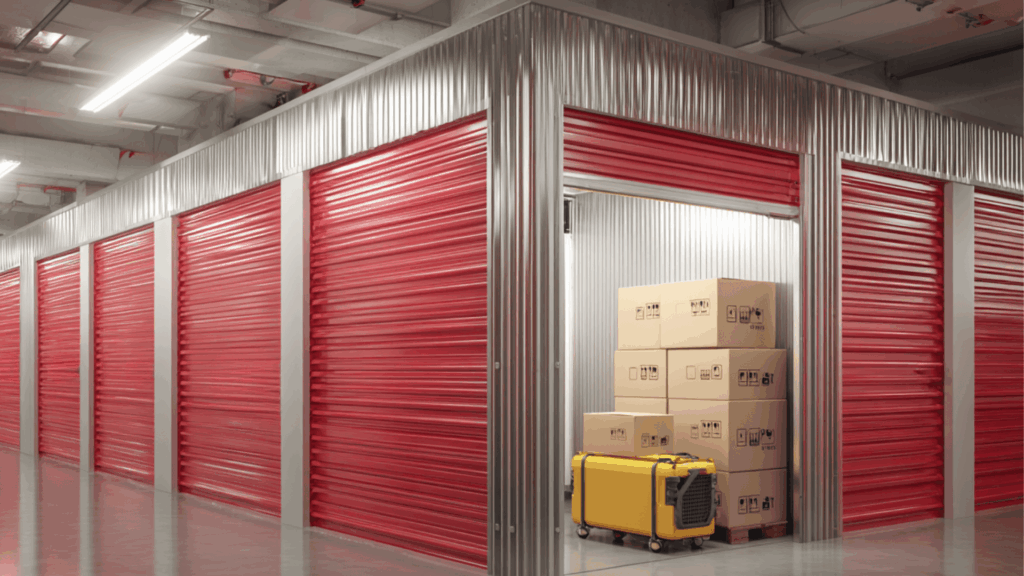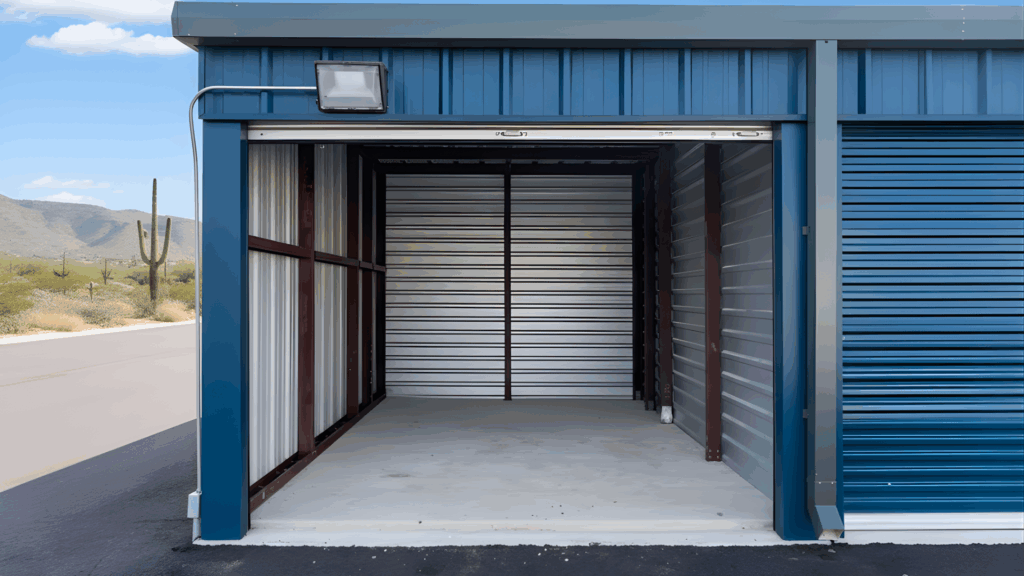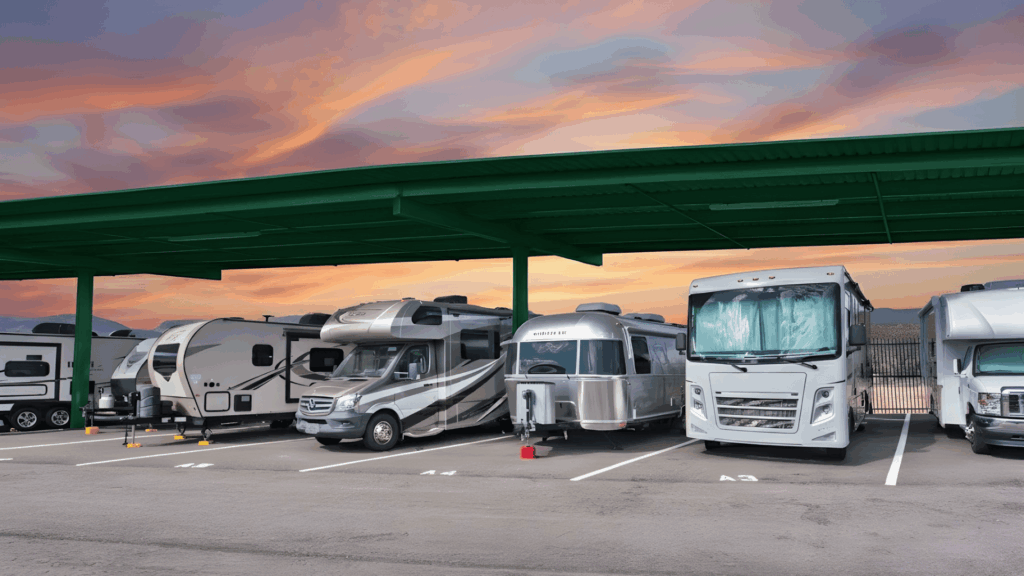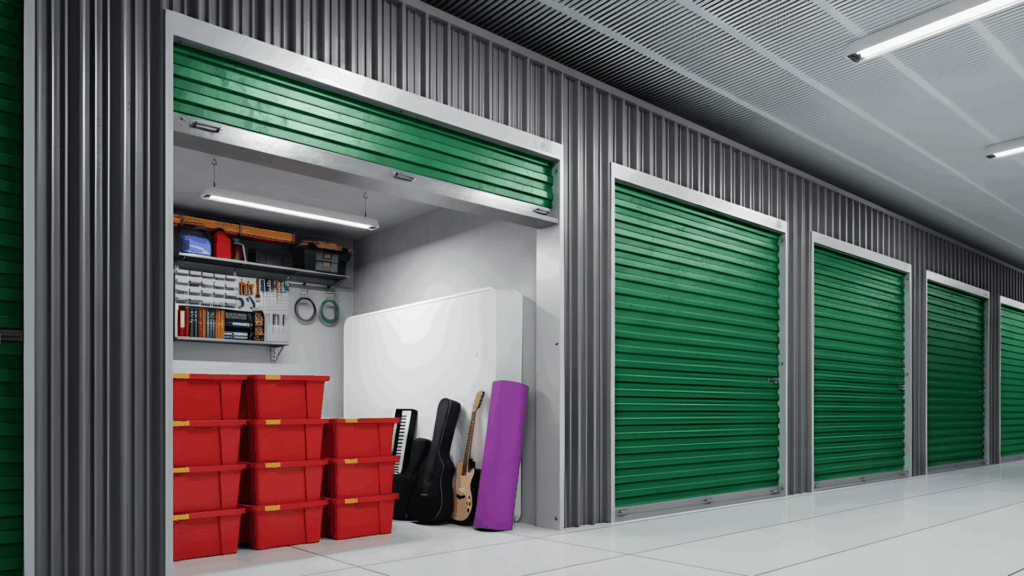Have you ever asked yourself, “Can I plug in my devices inside a storage unit?” It’s a common question for anyone needing to charge tools, equipment, or electronics while using storage.
Storage units come in many types and setups, depending on what you’re storing. Some are climate-controlled to protect temperature-sensitive items, while others are drive-up units that make loading easier.
The right one for you depends on what you plan to keep, how often you’ll need access, and how much protection your belongings require.
In this blog, I’ll explain which storage units may have outlets, why most don’t, and what your safe alternatives are if you need electricity access.
Do Storage Units Have Electrical Outlets?
Most storage units don’t include electrical outlets because they’re made for safe storage, not for running equipment or powering tools. Still, a few upgraded or specialized units offer limited power for light use.
Why Most Units Don’t Include Power
- Fire hazards and electrical risks: Units often contain flammable items like cardboard or fabric. Electricity can cause sparks or overheating, which may lead to fires.
- Insurance and liability restrictions: Many insurance plans exclude damage from electrical issues. Keeping units power-free helps facilities stay covered and avoid disputes.
- Preventing unauthorized activity: Access to electricity can tempt renters to live or work in units, which is unsafe and often illegal.
Exceptions Where Power is Available
- Climate-controlled units: These manage temperature and humidity. A few include outlets for light use, like a fan or lamp.
- Premium “electric” or “contractor” units: Designed for contractors or small business owners, these may include outlets for charging tools or equipment.
- Outdoor RV or boat units with external outlets: Often used for battery charging or short-term maintenance, with outlets placed outside the unit.
In short, most storage units don’t have outlets to ensure safety, but a few upgraded options provide limited electricity under strict facility rules
Top Storage Units with Electricity

Finding a powered storage unit isn’t common, but several providers now offer them for business use, vehicle storage, or specialized needs.
1. Apex Storage
Apex Storage is one of the few facilities in Utah offering units with built-in electrical outlets. These are ideal for contractors or small business owners needing light power access.
- Locations: Multiple across Utah
- Power Type: Dedicated outlets in select units
- Best For: Tool charging, business storage
2. A Family Storage
A Family Storage storage unit with electricity for creative projects, business use, or small workshops. They emphasize safe power usage and clear facility rules.
- Locations: Arizona and Texas
- Power Type: Standard 110V outlets (select units)
- Best For: Hobbyists, small business setups
3. Atlas Self Storage
Atlas Self Storage offers powered units in select facilities across the country. Their locations cater to customers who need occasional access to electricity for small tools or maintenance.
- Locations: Various U.S. states
- Power Type: Available upon request in certain units
- Best For: Contractors, vehicle owners
4. Mini U Storage
Mini U Storage provides specialized powered units at select branches for customers who need temporary or low-power electrical use. Availability depends on state and facility type.
- Locations: Across several U.S. regions
- Power Type: 110V outlets (select units)
- Best For: Business tools, light charging
Cost Comparison for Powered Storage Units
Below are general price ranges for storage units that include electricity. Actual costs vary by location, facility type, and power usage.
| Type / Feature | Estimated Extra Charge (US) | Availability |
|---|---|---|
| Simple 110V Outlet in Unit | $10 – $30 / month | Common in select business or contractor units |
| Metered Electricity Usage | $0.10 – $0.25 per kWh | Rare; found in large or industrial facilities |
| Business / Contractor-Grade Powered Unit | $25 – $75 / month | Limited availability in commercial storage centers |
| Deposit / Inspection Fee | $50 – $200 (one-time) | Often required for powered or high-usage units |
| Initial Hookup / Wiring Upgrade | $100 – $400 (one-time) | Only available in premium or customized units |
Electricity Use Guidelines for Storage Units
Before renting a storage unit with power, keep these key points in mind:
- Check how electricity access works: Ask the facility manager to explain how power is provided and controlled in the unit.
- Find out if the outlet is dedicated or shared: Shared outlets may limit when or how long you can use power.
- Ask about usage restrictions: Many facilities only allow light electrical use, such as charging tools, running small fans, or powering LED lights.
- Verify the voltage limit: Most outlets offer 110 volts, but some may restrict you to lower-wattage devices for safety.
- Confirm all details in writing: Understanding the facility’s rules upfront helps you avoid power issues and stay within lease terms.
Knowing these details before you rent ensures you pick a storage unit that safely meets your power needs without any surprises later.
Rules and Safety Considerations
If your storage unit has power, make sure you understand the safety rules before using it. Each facility sets limits to prevent accidents and damage, and breaking those rules can lead to extra fees or even eviction.
Legal Restrictions and Lease Rules
Using electricity without permission can void your lease and get your contract canceled. Most storage facilities don’t allow heaters, refrigerators, or high-voltage tools because they’re unsafe and can overload circuits.
Always check with the facility manager before plugging anything in. Getting approval helps you stay compliant and avoid penalties or eviction.
Fire Safety and Insurance Concerns
Electricity inside storage units increases the risk of fire. Items like cardboard, wood, and fabric burn easily, making electrical sparks dangerous.
Most facilities ban flammable materials and appliances to reduce hazards. If a fire starts due to unauthorized power use, insurance won’t cover the damage. Keeping your unit power-free and following the rules protects your belongings and your wallet.
Power Alternatives for Storage Units

If your storage unit doesn’t have outlets, there are still safe ways to power small devices or lights. These options offer limited electricity without breaking facility rules. Always check with the manager before using any power source.
| Power Option | Description | Best For |
|---|---|---|
| Portable Power Stations | Compact, rechargeable units that store electricity for short-term use. | Charging phones, LED lights, or small fans. |
| Solar-Powered Solutions | Small solar kits that capture sunlight and store it in batteries. | Outdoor or RV units with good sun exposure. |
| Battery Packs or Generators (If Allowed) | Battery packs are rechargeable; generators produce higher output for temporary power. | Small tools or short-term projects needing extra power. |
In short, portable power stations, solar kits, and battery packs give you safe, simple ways to get limited electricity in your storage unit.
Working from a Storage Unit: What’s Allowed
Turning a storage unit into a workspace might seem convenient, but it’s usually against both facility rules and local zoning laws. Storage units are meant for storing items, not for running businesses or daily work.
- Local Rules and Zoning Limits: Most facilities are zoned for non-commercial use, so operating machinery or setting up shop can lead to fines, warnings, or lease termination.
- Facility Policies and Risks: Working inside increases fire and injury risks, which is why activities like woodworking or assembly are prohibited. Facilities often monitor units, and repeated violations can result in permanent bans.
- Better Alternatives: For light work, look into co-working storage units, small commercial warehouses, or rented garages. These spaces are safer, legal, and designed for hands-on use.
Conclusion
Most storage units don’t have electrical outlets because they’re built for safe storage, not for powering tools or equipment. Adding outlets could create fire hazards or violate safety codes.
However, if you need power for light use, there are safe and legal options. Some facilities provide special units with limited electrical access, while others permit the use of portable power stations or solar kits.
Before plugging anything in, always confirm your facility’s rules and restrictions. By understanding your options and following safety guidelines, you can find convenient, low-risk ways to power what you need inside your storage unit.




